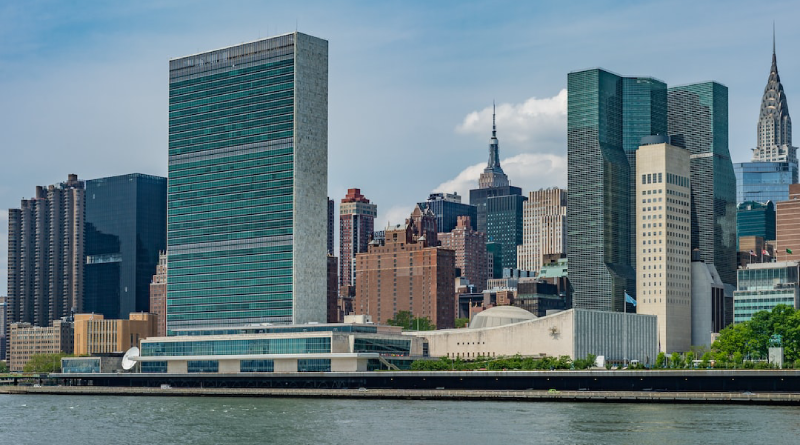Why is the United Nations in Such Disarray?
Two 21st century trends leave Turtle Bay unsettled.
By Daniel Drezner, Professor of International Politics at the Fletcher School of Law and Diplomacy
Over the weekend Politico’s Nahal Toosi wrote, “The UN is in disarray over the Israel-Hamas war.” The story is about all the ways in which the Israel-Hamas war is tearing apart the United Nations.
Full disclosure: if anyone other than Toosi had written an article with that title, I probably would not have read it. That’s because I was pretty sure I already knew why the U.N. is in disarray. As a fan of Toosi’s work, however, it seemed worth checking out. And sure enough, her reporting offers up an additional explanation that suggests that Turtle Bay is going to be dysfunctional for a long, long time.
The first, obvious reason for the bad blood at the United Nations — in other words, the reason that I had already figured out — is the increase in great power competition. As China, Russia, and the United States have adopted more revisionist approaches towards the existing order, the U.N. Security Council has ceased to be a problem-solving venue, instead becoming a forum for contestation. According to Toosi:
The initial Hamas attack drew denunciations from many corners of the U.N., including Secretary-General Antonio Guterres. But the Security Council — the U.N.’s most powerful body — was immediately riven. While the U.S. demanded countries condemn Hamas by name, some countries reportedly refused — opting for generic condemnations of attacks on civilians.
In the days since, Russia and the United States have quarreled over the texts of potential Security Council resolutions, each accusing the other of bad faith and offering varying descriptions of where they really stand. Members diverge on whether to call for a cease-fire, whether to say Israel has the right to self-defense and whether to even mention the initial attack in statements.
So this is unsurprising.1 The Security Council has grown increasingly unable to take action on much of import. It’s been nine years since there was an agreement to deploy U.N. peacekeepers and even longer since the UNSC agreed on sanctions. This is not because the world has gotten more peaceful over the last decade! Obviously the United Nations does more than sanction and deploy peacekeepers, but it’s definitely a tell.
Toosi, however, raises another reason for the tensions in Turtle Bay: the behavior of the Israeli ambassador.
This time, the actions of the Israeli ambassador, Gilad Erdan, have startled many in the U.N. system, where decorum is prized.
During at least one U.N. gathering, Erdan wore a yellow star patch on his suit — a reference to an identifying measure used against Jews during the Holocaust. Erdan also has called for the resignation of Guterres, the secretary-general, who has supported a cease-fire and pointed to the long history of Palestinian suffering in discussing the current war.
Israeli officials accused Guterres of effectively justifying the Hamas attack, even though he has condemned them. But Erdan’s call for Guterres to step down galled some U.N.-based diplomats who said Guterres often takes positions that run against the interests of an individual state if he believes it’s in line with U.N. principles.
Erdan said he has no choice in a system he described as tilted against Israel and sympathetic to terrorism by Palestinians who seek to eradicate his country.
“Sometimes I need to shock the U.N. bodies to show them what we truly think about how they treat Israel with double standards that they do not apply to any other country in the world,” he said.
The United Nations, he argued, “can be relevant only to allow countries to explain their decisions and acts. But surely it cannot be the arena now to solve any kind of conflicts.”
No doubt, Erdan is correct about the longstanding U.N. tilt against the state of Israel. But his tactics to compensate for that tilt are not winning Israel any hearts or minds among the U.N. diplomatic corps. If anything, they seem designed to further antagonize U.N. staff and missions to Turtle Bay.
Then again, as Erdan explained in his statements to Toosi, he is not terribly interested in traditional diplomacy. He recognizes the persisting stalemates. So long as the United States remains committed to defending Israel at the U.N., there will be no real-world consequences to Israel for anything happening in Turtle Bay.
In a weird way, this frees up ambassadors like Erdan to engage in provocation.2Shocking the U.N. will not persuade any diplomats. It might, however, rally those beyond Turtle Bay who are sympathetic to Israel’s stances on the conflict. It also serves the purpose of playing to nationalists in Israel who want to see someone vociferously defend Israel at the United Nations. That is leaves organization with a culture of decorum in disarray is probably a bonus for Erdan.
Unfortunately, Erdan’s behavior is emblematic of another 21st century trend — international diplomacy designed exclusively to appeal to one’s political base rather than persuading other actors in world politics.
1 Toosi also mentions the blow to morale from the loss of U.N. employees stationed in Gaza due to Israeli bombing, which is also completely understandable.
2 Yesterday Erdan claimed on CNN that “there is no humanitarian catastrophe in Gaza.”
(This post is republished from Drezner’s World.)

